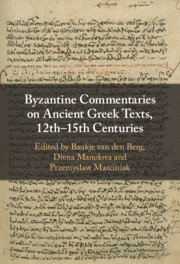5 - The Didactic Poetry of Niketas of Herakleia and the Use of Verse in Byzantine Teaching Practice
- from Part II - Poetry and the School
-
- Book:
- Poetry in Byzantine Literature and Society (1081-1204)
- Published online:
- 17 October 2024
- Print publication:
- 31 October 2024, pp 139-160
-
- Chapter
- Export citation

Byzantine Commentaries on Ancient Greek Texts, 12th–15th Centuries
-
- Published online:
- 07 August 2023
- Print publication:
- 08 September 2022
Chapter 12 - Theodora Raoulaina’s Autograph Codex Vat. gr. 1899 and Aelius Aristides
-
-
- Book:
- Byzantine Commentaries on Ancient Greek Texts, 12th–15th Centuries
- Published online:
- 07 August 2023
- Print publication:
- 08 September 2022, pp 339-359
-
- Chapter
- Export citation
Chapter 1 - The Young Manuel
-
- Book:
- Manuel II Palaiologos (1350–1425)
- Published online:
- 25 February 2021
- Print publication:
- 11 March 2021, pp 25-54
-
- Chapter
- Export citation


